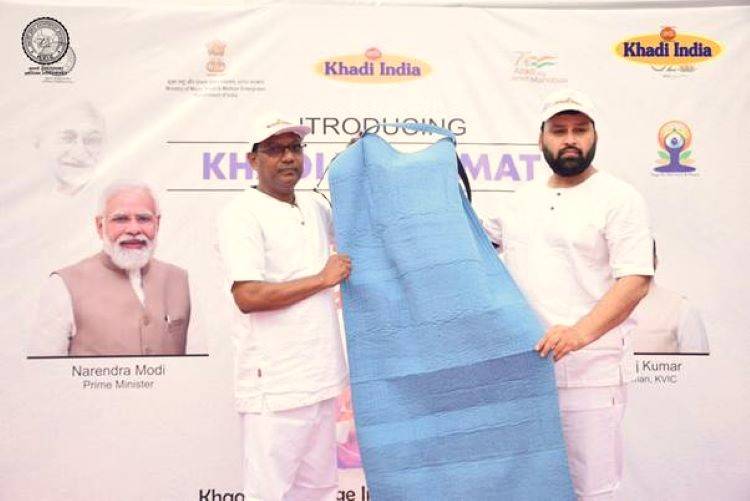


The International Yoga Day, celebrated globally on June 21 every year, has brought major success to the Khadi and Village Industries Commission (KVIC), with sales of yoga mats and clothes amounting to a whopping Rs 8.68 crore. This not only promotes India's heritage of yoga and Khadi, but also boosts employment opportunities for Khadi artisans in rural areas and contributes to the country's 'Vocal for Local' and 'Aatmanirbhar Bharat Abhiyan' campaigns. The eco-friendly and chemical-free Khadi products used in yoga practice bring additional health benefits and add to the 'brand power' of Khadi.
International Yoga Day: Khadi Sales Soar, Boosting Rural Employment
International Yoga Day, celebrated globally on June 21 every year, has witnessed a significant increase in the popularity of Khadi yoga mats and clothing. This has resulted in a remarkable boost for the Khadi and Village Industries Commission (KVIC), with sales amounting to an impressive Rs 8.68 crore.
This trend not only promotes India's rich heritage of yoga and Khadi but also provides employment opportunities for Khadi artisans in rural areas. It aligns with the government's "Vocal for Local" and "Aatmanirbhar Bharat Abhiyan" campaigns, which aim to boost domestic production and reduce reliance on imports.
The use of eco-friendly and chemical-free Khadi products in yoga practice brings additional health benefits and enhances the "brand power" of Khadi. The surge in Khadi sales on International Yoga Day is a testament to the growing awareness of the benefits of this traditional fabric and its relevance to modern-day wellness practices.
Top 5 FAQs and Answers Related to International Yoga Day
1. When and why was International Yoga Day established?
International Yoga Day was established by the United Nations in 2014 at the initiative of Prime Minister Narendra Modi. It is celebrated on June 21, the longest day of the year in the Northern Hemisphere, to symbolize the unity and harmony of yoga.
2. What is the significance of yoga in Indian culture?
Yoga has been an integral part of Indian culture for centuries. It is an ancient practice that combines physical postures, breathing techniques, and meditation to promote physical, mental, and spiritual well-being.
3. How has International Yoga Day impacted the global perception of yoga?
International Yoga Day has played a crucial role in raising awareness about yoga worldwide. It has helped to break down cultural barriers and dispel misconceptions about the practice. As a result, yoga has become increasingly popular as a means of improving health and well-being.
4. What are the benefits of practicing yoga?
Regular yoga practice offers numerous benefits, including:
5. How can I participate in International Yoga Day?
You can participate in International Yoga Day by attending local events, practicing yoga at home with the guidance of online resources, or simply taking some time to learn more about the history and principles of yoga.

Union Railway Minister Ashwini Vaishnav, at the International Railway Equipment Exhibition (IREE), highlighted India's remarkable progress in railway modernisation, stating that under the leadership of Prime Minister Narendra Modi, the country has witnessed the construction of 35,000 kilometres of new railway tracks and electrification of 46,000 kilometres of tracks in the past 11 years. He praised the Confederation of Indian Industry (CII) for organising the IREE and urged them to think bigger and envision a global-scale railway exhibition that surpasses Germany's InnoTrans, showcasing India's growing capabilities in railway infrastructure and technology.

On Friday, the IRCTC website and mobile app faced technical issues, causing an outage and inconvenience to over 5,800 users trying to book tickets. Social media platforms were flooded with complaints as the server crashed during peak booking hours, with some suggesting the need for better technology to handle festive rush. Officials have assured that efforts are being made to restore normal operations.

In a boost for the festive season, Indian Railways has launched two special Vande Bharat trains between Delhi and Patna. These trains will run till November 17 and offer a luxurious and secure travel experience for passengers during Diwali and Chhath Puja. With stops at six important stations, these trains will cover a distance of 1,000 km in under 14 hours.

As India prepares for Dhanteras 2025, gold has already become the star of the show, with prices surging more than 50% this year and showing no signs of slowing. The combination of global and domestic factors, including safe-haven demand, central bank buying, and economic uncertainty, has pushed gold to an all-time high of over Rs 1,30,000 per 10 grams. As investors flock to add the precious metal to their portfolio, experts predict a continued upward trend, driven by lower interest rates, de-dollarisation, and geopolitical tensions.

India’s economy and markets are seeing a resurgence, with PE and VC investments soaring to a three-year high of $26 billion in 2025. The country’s growing affluence and digital transformation have spurred a luxury market boom, with high-end brands rushing in to meet the demand. The trend is supported by a shift towards larger, more strategic investments in sectors such as IT and consumer staples.

MCX December gold futures on the Multi Commodity Exchange (MCX) skyrocketed by 1.4%, reaching an all-time high of ₹1,32,770 per 10 grams. Meanwhile, silver prices dropped slightly on the MCX to ₹1,85,000 per kilogram. The surge in gold prices can be attributed to a weaker US dollar, strong spot demand, and positive global cues, making gold an attractive investment option. However, the rising prices may have an impact on shoppers this Diwali, as the cost for 10 grams of 24-carat gold has surpassed ₹1.3 lakh. Despite this, jewellers remain optimistic, as increased household liquidity and positive economic indicators continue to encourage discretionary spending.

The well-known fitness club chain, Planet Fitness, has recently opened a new location in Monument, Colorado. Located at 16096 Jackson Creek Parkway, the club will hold its official grand opening on Saturday with a celebratory event at 10 a.m. This new location promises to offer residents of Monument a state-of-the-art fitness facility and a wide range of amenities.

The CEO of Virgo Specialities Pvt Ltd, Ketan Kadam, has been denied bail for the second time for his alleged involvement in the Mithi river desilting scam. The sessions court noted that Kadam has "direct involvement" in the crime, having "managed money received from contractors in his shell companies." According to the Economic Offences Wing (EOW), Kadam and others conspired to defraud the Brihanmumbai Municipal Corporation (BMC) through irregularities in the tendering process. Kadam is accused of manipulating the terms and conditions of the tenders to benefit his company and causing losses to the BMC.

As India's luxury market continues to see a rise in demand, M3M India, one of the biggest real estate developers in Delhi-NCR, has announced the launch of Jacob & Co. Residences in Noida. This will be the first residential development in India under the iconic Jacob & Co. brand, and is expected to generate a topline of ₹3500 crore. The project will feature ultra-luxury serviced residences and limited-edition Jacob & Co. timepieces, elevating the ownership experience to a whole new level. With this venture, M3M aims to bring a truly global lifestyle to homebuyers in Noida and contribute to the nation building vision of Prime Minister Narendra Modi.

Get the latest and most trusted insights on the world of business and finance delivered straight to your inbox by subscribing to our newsletters. Our team of experts curates exclusive content that you can rely on, without any bias or external influence. Stay informed and ahead in the ever-changing world of business with our newsletters.